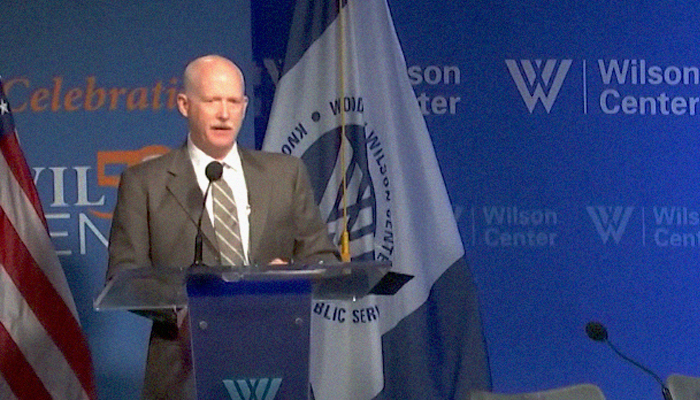WASHINGTON: US President Donald Trump’s administration would continue to apply pressure until Pakistan changes it changes its policy towards regional peace and stability in Afghanistan, an official of the Department of State said on Wednesday night.
Speaking during an event here at the Wilson Centre, Henry Ensher, the Acting Deputy Assistant Secretary for Pakistan for the State Department, said efforts to bring peace and stability in Afghanistan were of primary importance and a major area of policy divergence, at the moment, with Pakistan despite the important bilateral linkage having many common interests.
“As long as that continues, we will continue to colour and take centre stage in [the] bilateral relationship,” Ensher said.
“In reality, we have seen some action but we have not seen the decisive steps from Pakistan that could demonstrate commitment, ensuring their territory cannot be used by the Taliban, the Haqqani Network, and other groups that were so violent and bring instability in the region,” he added.
The State Department official argued that Trump’s strategy for South Asia and the suspension of security assistance and coalition support fund (CSF) payments to Pakistan reflect Washington’s concerns over Islamabad’s continuing counter-productive policies.
He added, however, that Pakistan’s new civilian government, led by Prime Minister Imran Khan, has the opportunity to fix bilateral relations and be “our partner in bringing peace and stability to Afghanistan and peace and security in Pakistan.
“Doing so will enable more mutually beneficial relationship,” he noted, stressing that the US has signalled its commitment but opportunities could not be merely discussed until an action is taken.
“A future course of our relationship, and indeed the trajectory of Pakistan’s development, rest in the hands of Pakistani leaders,” he said.
Ensher pointed out that there were two criticisms of US policies that he comes across frequently. First, the US-Pakistan relations were too Afghan-centric, and the second being disagreements with the use of pressure to try to induce a shift in Pakistan’s own regional policies.
He reasoned that the US has been engaged in the conflict for 17 years. It has more than 15,000 troops on the ground, spent more than $900 billion so far, and endured more than 2200 deaths.

The official agreed that the Trump administration was more willing to applying pressure to advance US national interests.
“We will continue to do so in South Asia as well as elsewhere, but it should not disguise the fact that we genuinely believe that a shift in Pakistan policy in aligning with our strategy is very much in Pakistan’s own interests as well.”
Addressing the audience, he warned that Pakistan’s status quo in Kabul does not serve its own interests, as Daesh remains a threat to Pakistan, Afghanistan, and the regional nations, as well as the fact that the Tehrik-i-Taliban Pakistan (TTP) could use Afghan territory as a platform for attacks in Pakistan.
He appreciated Pakistan’s support for ending the conflict through a negotiated settlement by bringing the Taliban to table.
“We know that Pakistan can’t deliver a deal by itself, but Pakistan can play constructive role. We welcome additional measures that Pakistan government could take to increase the willingness of the Taliban leadership to negotiate,” he said.
He reminded that the long-standing proxy policies and unresolved regional tensions have had a steep cost for Pakistan in numerous ways.
Pakistan has a potential to be a leader in the region — economically and politically — but its policies have instead fed instability and division both in South Asia as well as in the country itself, he said.
Washington also encouraged bilateral discussion between Pakistan and India to reduce the tensions and lead to an improvement in the relations, he said, adding that the presence of terrorist groups on Pakistani soil would limit the potential for a positive outcome from such a dialogue.
Ensher said the US encouraged Pakistan to address these issues so that the regional tensions were resolved and regional connectivity could improve, helping the Indo-Pak trade, as per World Bank’s estimates, jump from the current $2 billion to $37 billion.








